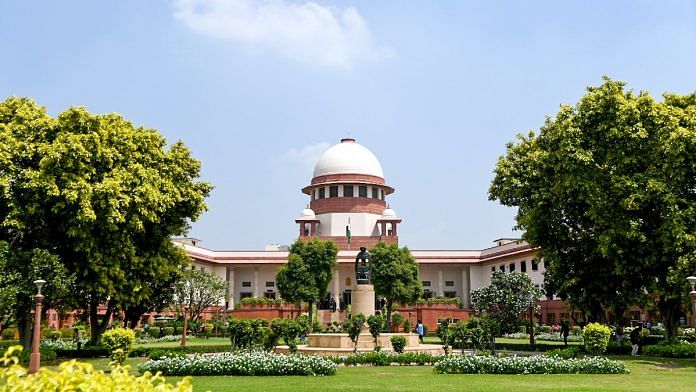New Delhi: Come 3 July and the first three courtrooms of the Supreme Court are set to witness a makeover. Equipped with the latest technology and software, these three courtrooms will work as paperless courts from Monday onwards, when the apex court resumes hearings after a 45-day summer break.
While courtroom 1 is presided by Chief Justice of India D.Y. Chandrachud, courtroom 2 is headed by Justice Sanjay Kishan Kaul and courtroom 3 by Justice Sanjiv Khanna.
On Monday, Justices P.S. Narasimha and Manoj Misra will constitute the bench with CJI Chandrachud, while Justice Sudhanshu Dhulia will sit with Justice Kaul and Justice Bela M. Trivedi with Justice Khanna.
None of these courtrooms will see physical files for judges presiding in them. Each of them will work either on their laptop or iPads that would contain digitised versions of all the cases listed before them.
“Normally, physical case files are prepared for all the judges and are then sent to respective courtrooms in the morning every day. However, from Monday onwards, no physical files would be sent to these three courtrooms and the judges sitting in them would have to peruse case files digitally,” explained an officer of the SC registry who did not wish to be named.
According to sources, it was CJI Chandrachud’s proposal to first convert these three courtrooms paperless and then gradually extend it to others. This is the second time that the court has embarked upon the ambitious project to go paperless.
In March 2017, the institution under the then Chief Justice J.S. Khehar had initiated the process to go digital. Former CJI Khehar had envisioned making the top court paperless in 200 days, given that bulky case files need a lot of storage space, which the institution is hard-pressed for.
However, the project was stopped midway owing to technical gaps.
Also Read: Who will rule Delhi’s officers? AAP challenges central ordinance in Supreme Court
Judges’ libraries
Another stark change seen in these three courtrooms is the absence of shelves that once stored books for judges. These shelves were an extension of judges’ libraries.
Books kept in them were taken out as and when lawyers during arguments gave citations or references while arguing their cases. Called as manuals, these books are a record of previous important Supreme Court rulings, which get quoted by the legal fraternity in support of their matters.
But all of this would be history now. With a new library software in place, these citations or case references would flash on the new display screens that have been installed for judges sitting in these court halls.
Explaining this, the officer quoted above said: “A list of citations or earlier SC judgements is submitted by the lawyers in every case. Also called case laws, these verdicts are referred by advocates in support of their matters. This list is provided to the library person appointed in each courtroom at 10:30 in the morning so that the books are kept ready for the judges.”
However, with the new library software in place, this procedure would become electronic. The officer added advocates now have to submit the list of such citations electronically, preferably a day in advance. This would then enable the library person in the courtroom to electronically feed the case laws into the new display screens installed for the judges.
Similarly, these judgements would also be displayed electronically to the lawyers on the display screens that have been put up for them on the side from where they stand and argue.
Though the judges in these courts would work in digital mode, the lawyers appearing before them can opt for the medium as per their own choice.
“We are not imposing any instructions on advocates at present. They are free to choose. If they want to carry physical files, they can. But we would definitely encourage work in digital mode,” another officer said.
Even though the top court has introduced electronic filing of cases, lawyers continue to do physical filing. Hence, the SC registry would undertake a fresh exercise of training lawyers as well as their clerks to promote e-filing of matters and fresh documents.
“Whether it is physical filing or e-filing, we digitise all case papers so that they can be formatted in a manner that is accessible to judges and match the pagination given to us by the lawyers. This is done so that there is no discrepancy or difference on the numbering of pages between the judge’s and lawyer’s file,” the officer added.
(Edited by Amrtansh Arora)
Also Read: SC upholds HC order to deploy central forces in Bengal for ‘free & fair’ panchayat polls



